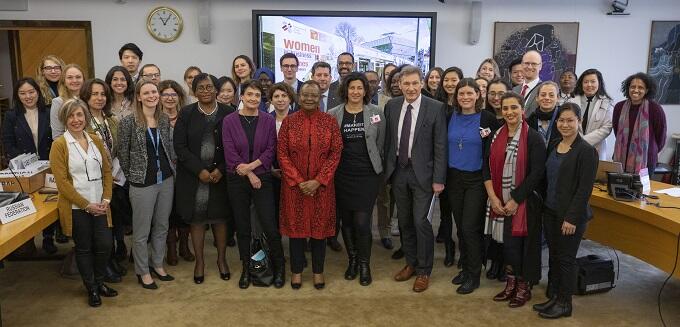
Women must play an equal role in world economy
The health of the world economy can only be maintained by a concerted effort to increase the participation of women in trade and entrepreneurialism, speakers from business and government said at an event to mark International Women’s Day 2020 held by the International Trade Centre in at the Palais des Nations in Geneva on 2 March.
ITC acting Executive Director Dorothy Tembo told the meeting that the role of women as drivers of economic and social progress had been recognised more and more in the last 40 years but that ‘half the world remains left behind’.
‘From the policy perspective, we have to understand what works and what doesn’t; and how to break out from silos,’ she said. ‘It’s not just about Sustainable Development Goal 5 on women’s equality but the whole 2030 Agenda, none of which can be achieved without women’s full participation in the economy.’
Tatiana Valovaya, Director-General of the United Nations Office at Geneva, said that small businesses run by women did more for their communities than those run by men. Investing local women-led businesses at the grassroots in developing countries was money well spent, she said.
Ambassador Walter Stevens of the European Union said that there were more women in the EU than men but women run only one-third of start-ups. He said it was important to lower the threshold for women to enter business.
‘It simply makes sense from a social and economic perspective,’ he said.
Swiss entrepreneur Julie Bordier, founder of L’Effet Papillon, said that women still faced barriers in the world of business despite years of warm words. Ambassador Martha Lungu Mwitumwa of Zambia added that it was crucial for governments to listen to what women were actually saying on the ground. For Ambassador Monique T.G. van Daalen of the Netherlands, it was crucial to remove laws restricting women’s economic activity still on the books in 90 countries.
Sacha Silva of the United Kingdom Mission to Geneva said that ITC’s work on women’s economic empowerment was effective because it attacked the problem holistically – working with women already in business to give them the information they needed as well as working with governments to analyse what worked from the policy perspective. Programmes such as ITC SheTrades also achieved scale by using the power of platforms, he said.
Mine Uran, chief executive officer, Alver World, said she had worked for corporates such as DuPont and Nestle, and now ran her own business.
‘What I’ve learned is that women have to have self-belief to overcome the barriers that men simply don’t face. But we can overcome these barriers,’ she said. ‘So much has changed in the last 20 years and so much more change will come.’
The event, which was moderated by the BBC’s Imogen Foulkes, kicked off ITC’s International Women’s Day 2020 campaign focusing on businesswomen who are beneficiaries of its programmes.
Their stories and images are also being featured on trams and buses run by les Transports publics genevois (TPG) in Geneva, Switzerland, during March 2020.



